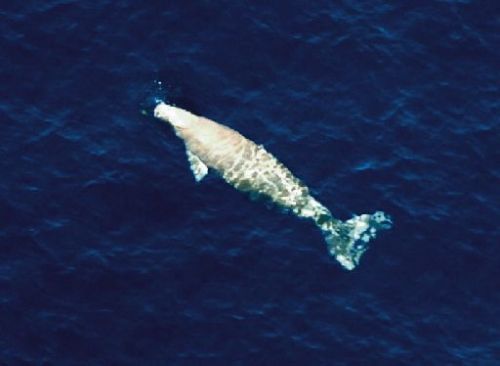Ninth Circuit deems DOD judgment “reasonable” in possible final ruling of “dugong case”

An aerial shot of an Okinawa dugong taken near Kayo, Nago City, in March 2008. Dugongs are an endangered species, designated a “national natural monument” by the Japanese government.
May 9, 2020 Ryukyu Shimpo
On May 6, the U.S. Court of Appeals for the Ninth Circuit in San Francisco ruled against the Japanese and American environmental groups that brought a “dugong suit” against the U.S. Department of Defense (DOD) in an effort to stop the construction of a new military base in Henoko, Nago City, Okinawa. The appellant groups claimed that the DOD violated the National Heritage Protection Act (NHPA) by giving insufficient considerations to how the Henoko base construction could disturb the lives of Okinawa dugongs, which are designated a “national natural monument” and protected under Japanese laws. In its recent ruling, the Ninth Circuit panel concluded that the DOD’s processes were reasonable.
The appellant groups are considering a further appeal, but because the U.S. Supreme Court selects only a limited number of cases, the panel’s ruling may be the final judgment on the matter.
Although the Ninth Circuit panel agreed in part with the appellants that “the [Defense] Department did not specifically consider population fragmentation and the disruption of travel routes [of the dugong],” it concluded that “there was no data suggesting that the construction and operation of the new base would further fragment the dugong population or interfere with existing dugong travel routes to their habitats and/or potential feeding groups.” The panel stated that the DOD was “not unreasonable” in its judgment that the Henoko base construction would not adversely impact the dugongs.
The appellant groups had also argued that the DOD failed to engage in sufficient discussions with interested Okinawan entities, but the Ninth Circuit panel concluded, “The Pentagon was not required to consult with any specific person or group.” The judges found that while the DOD did not engage in direct discussions with local organizations, it obtained necessary information indirectly; the ruling effectively allowed the DOD broad discretion to decide what qualifies as “consideration” required under the NHPA regulations.
Interestingly, in February the DOD had argued that dugongs do not qualify for protection under the NHPA, but the recent Ninth Circuit decision affirmed the district court ruling in which dugongs were found to be eligible for protection under the NHPA.
(English translation by T&CT and Monica Shingaki)
Previous Article:As Okinawan mangoes and pineapples begin to ripen, a call goes out for locals to consume the harvest to overcome the headwinds created by the coronavirus
Next Article:Teachers at Ohama Elementary School in Ishigagi write message for children in flowers on the sports ground, “It will certainly be soon”
[Similar Articles]
- US federal appeals court reinstates Okinawa dugong lawsuit, plaintiffs’ argument partly supported
- Okinawa dugong plaintiffs file new action in US court to stop construction of air base in Henoko
- Dugong lawsuit plaintiffs submit brief claiming DoD not consulting local citizens violated NHPA
- Dugong lawsuit dismissed in San Francisco District Court in favor of U.S. government
- Onaga interviews Center for Biological Diversity personnel about U.S. dugong lawsuit with DoD
 Webcam(Kokusai Street)
Webcam(Kokusai Street)


